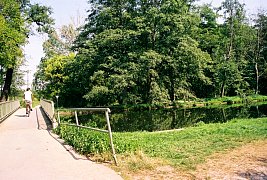
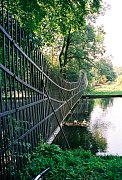 Very near Frieda's house in Pasing is the Nymphenburg Palace. The three
of us rode bicycles there. I am always concerned about my back, but thanks
to Vioxx and Margaret's back-cracking experitise, I am able to do even this activity.
A canal leads runs into the palace grounds. Here an iron gate
stretches across it to prevent entry. Good thing we decided to ride
bikes here and not take our barge!
Very near Frieda's house in Pasing is the Nymphenburg Palace. The three
of us rode bicycles there. I am always concerned about my back, but thanks
to Vioxx and Margaret's back-cracking experitise, I am able to do even this activity.
A canal leads runs into the palace grounds. Here an iron gate
stretches across it to prevent entry. Good thing we decided to ride
bikes here and not take our barge!
|
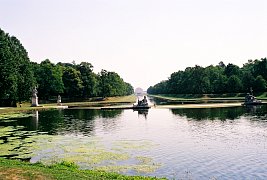
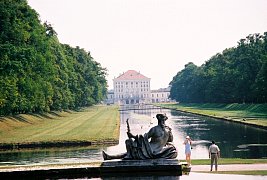 Nymphenburg Palace was begun in 1664 by the Wittelsbach family who ruled the Duchy of Bavaria.
We have entered the extensive palace grounds from the rear gardens.
The large Baroque style palace northwest of Munich was started in 1664 and took more than 150
years to complete. It was created to celebrate the birth of the son and heir of
Elector Ferdinand Maria and his consort Henriette Adelaide of Savoy. They appointed architect Agostino
Barelli to build them a summer residence. The Wittelsbachs would pack up their bags and head for
Nymphenburg Palace(Schloss Nymphenburg),
a more complete, more sophisticated palace than the Residenz in Munich,
Nymphenburg Palace was begun in 1664 by the Wittelsbach family who ruled the Duchy of Bavaria.
We have entered the extensive palace grounds from the rear gardens.
The large Baroque style palace northwest of Munich was started in 1664 and took more than 150
years to complete. It was created to celebrate the birth of the son and heir of
Elector Ferdinand Maria and his consort Henriette Adelaide of Savoy. They appointed architect Agostino
Barelli to build them a summer residence. The Wittelsbachs would pack up their bags and head for
Nymphenburg Palace(Schloss Nymphenburg),
a more complete, more sophisticated palace than the Residenz in Munich,
|
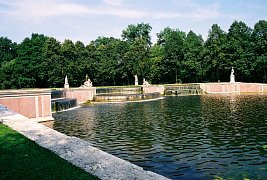
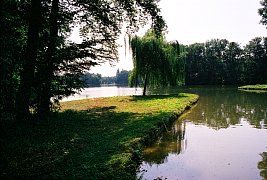 Nymphenburg's magnificently sculptured park stretches for 200 hectares (500 acres) behind the
palace. The frozen canals and lakes are a popular meeting point for ice skaters and people who play
curling on sunny winter days. At the end of eighteenth century, the original baroque garden was
fringed with an English landscape park.
Nymphenburg's magnificently sculptured park stretches for 200 hectares (500 acres) behind the
palace. The frozen canals and lakes are a popular meeting point for ice skaters and people who play
curling on sunny winter days. At the end of eighteenth century, the original baroque garden was
fringed with an English landscape park.
|
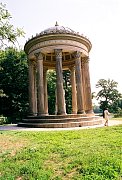 This circular temple, the Monopetros, was added in 1865.
This circular temple, the Monopetros, was added in 1865.
|
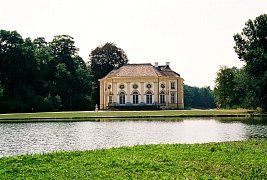 Three elegant baroque pavilions here on the palace grounds once had geometrical
gardens: the Pagodenburg (1716), the Badenburg (1719) and a hermitage known as the Magdalenenklause (1725). Now,
They now appear as temples in a landscape park. Max Emanuel's son added the Amalienburg in 1739.
he Badenburg Pavilion sits at the edge of the large lake of the same name. As its name implies, it was built
as a bathing pavilion, although it's difficult to visualize Ludwig dashing in from the water in a dripping swimsuit
and across those elegant floors.
Three elegant baroque pavilions here on the palace grounds once had geometrical
gardens: the Pagodenburg (1716), the Badenburg (1719) and a hermitage known as the Magdalenenklause (1725). Now,
They now appear as temples in a landscape park. Max Emanuel's son added the Amalienburg in 1739.
he Badenburg Pavilion sits at the edge of the large lake of the same name. As its name implies, it was built
as a bathing pavilion, although it's difficult to visualize Ludwig dashing in from the water in a dripping swimsuit
and across those elegant floors.
|
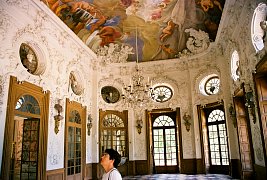 The ground level rooms are very elegant. The ceiling is painted
with frescoes of mythological bathing scenes.
The ground level rooms are very elegant. The ceiling is painted
with frescoes of mythological bathing scenes.
|
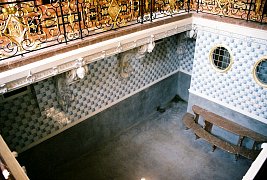
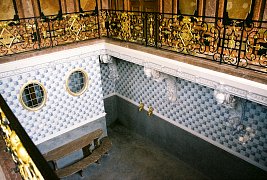 A trip to the basement, however, will help you appreciate the pavilion's
practical side. Here, surrounded by blue-and-white Dutch tiles, you'll see the
unique swimming pool, the very first in
all the history of Europe. .
A trip to the basement, however, will help you appreciate the pavilion's
practical side. Here, surrounded by blue-and-white Dutch tiles, you'll see the
unique swimming pool, the very first in
all the history of Europe. .
|
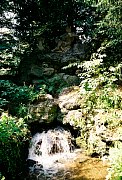 Here is a man made cascade at the far end of the English-style gardens.
The
landscape park was designed by Germany’s leading exponent of the landscape style: Ludwig von Skell.
He has the credit of making an ‘English garden’ without
destroying a baroque garden.
Here is a man made cascade at the far end of the English-style gardens.
The
landscape park was designed by Germany’s leading exponent of the landscape style: Ludwig von Skell.
He has the credit of making an ‘English garden’ without
destroying a baroque garden.
|
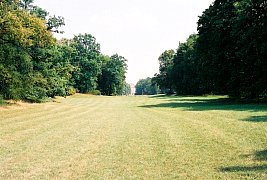 Enlarge this picture and you can see the palace in the distance. These long vista
views called "Durchblick"
are carefully planned so that those in the palace can gaze off into the distance.
You will note several people walking along a path at mid-distance to the palace.
Enlarge this picture and you can see the palace in the distance. These long vista
views called "Durchblick"
are carefully planned so that those in the palace can gaze off into the distance.
You will note several people walking along a path at mid-distance to the palace.
|












